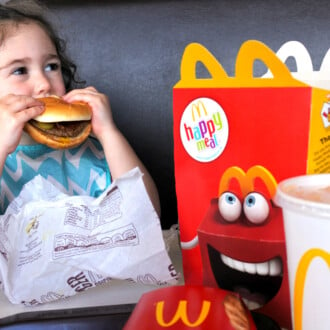Being mentally strong has been on the backburner in our society for quite some time. People thought it was better to be physically strong instead of mentally strong. However, nowadays it is showing just how important it is to have mental strength, especially for children. Here are 13 ways to help you raise mentally strong kids.

1. Get Rid of Victim Mentality
When your child fails, and they will eventually, it is not the end of the world. Teach them that failure is a part of their life and how to overcome it.
Don’t let them feel like they are a victim in those scenarios. Don’t play a part in their pity party. Instead, help them see the positive in everything.
2. Power Through Guilt
As a parent, you will feel guilty. However, don’t let your guilt control your actions, because your child is watching. If they see you conform to everything you feel guilty about, they will do the same.
Then, they won’t learn how to say no to someone, especially in bad situations. Teach your kids that even though you may feel guilty, you can still choose to make wise and good decisions.
3. Don’t Allow Fear to Govern Choices
This is similar to the one above as you don’t want to teach your kids to give in to negative emotions, especially fear. While it is perfectly normal to have fear, we must teach our children that they don’t have to make choices out of fear.
Teach them that the best way to overcome their fear is to tackle it right away. Continue to build confidence rather than act out of fear.
4. Show Them the World
While your children are our entire worlds, they can’t fully believe that. We must show them that there is a whole entire world out there, and they are not the center of the universe.
Teach your kids to give to the world rather than always taking or expecting things from it.
5. Family Hierarchy
You need to show them that they are not in control of everything that goes on in the family. While it is important to have them make choices for smaller events, we cannot let them dictate every choice in the family.
There needs to be a hierarchy in the family, letting them know that you are in control. They will need to learn to take orders that they don’t fully want to follow.
6. Don’t Avoid Responsibility
While it may seem easier to do your child’s chores, it is not worth it in the end. They need to learn a sense of responsibility and to take action for themselves.
Find things for them to take responsibility for themselves that are age-appropriate. That way they are not overburdened but gain that mental strength.
7. Don’t Expect Perfection
No one will ever be perfect in this life, teach that to your child. Don’t expect them to never fail or to get straight A’s as it will only hurt them in the future.
Teach them to learn from their mistakes and pick themselves back up when they fall down.
8. Don’t Shield from Pain
Bad things are going to happen in life; that is inevitable. Your kids need to learn how to successfully manage their negative emotions instead of burying them or hiding beneath them.
Teach your kids to always strive to be the best person they can be, not to be perfect. This will help them to be resilient when hard times come.
9. Teach Consequences
You cannot fully protect your child from everything. They need to learn how natural consequences work and what to do with them. Don’t fix your child’s homework or triple check if they turned something in.
Allow your kids to mess up and then teach them how to handle it afterward.
10. Teach Emotions
One of the best things you can do for your children is to help them learn to control their own emotions. Teach them how to overcome sadness or anxiety rather than constantly trying to cheer them up.
11. Discipline vs. Punishment
Punishment is when your child suffers for doing something wrong. Instead, discipline them so they know what to do better for the future.
Teach them to want to make good choices instead of fear of getting in trouble.
12. Make Priorities
Show your children how to make and keep good priorities. Allow them to see the bigger picture in life and not get so caught up in the little day-to-day events.
Teaching about priorities will help them to set good priorities for themselves and set themselves up for success in the future.
13. Don’t Take Shortcuts
Shortcuts will never lead to anything good. Teach your kids that patience is better than receiving something right away through a shortcut.
Find ways to teach delayed gratification as it will help your kids to become mentally strong.
If you teach your children these 13 different things, you will set up your kids for success and they will be mentally strong. It may be a challenge at times, but completely worth it in the end.
14. Teach Realistic Thinking
Sometimes kids can feel down on themselves for things like performance at school, sports, etc… We as parents tend to give our own words of encouragement, but we should talk with our kids about how thoughts aren’t always true. Sometimes it’s important to shift our thoughts into other directions of positive thinking.
15. Engage with Problem Solving
Talk about issues they might be struggling with and come up with solutions together. Whether it be a behavior problem or having trouble with friends, etc… brainstorm a set of solutions as a team.





Leave a Review!
We LOVE hearing from you! Submit your question or comment here.
Your email address will not be published.
7 comments on “How to Raise Mentally Strong Kids”
I think this list could get rid of 5 or 6 of these – or at least part of the explanation. But it seems I’m in the minority. (Facebook comments on this article) I know I have a different style of parenting – probably because I had a parent who committed suicide when I was 15. Mental strength and health have always been my top priority.
For what it’s worth, TO ME the worst offenders were:
1 . Family Hierarchy – why does this assume that if children make any choices other than “for smaller events” they must be “dictating to the family.” We always asked for our child’s opinion. We took turns making choices. Why? Because he IS a part of the family and his opinion DOES matter. I will never teach him to go along to get along. You want to see someone who can’t say no in bad situations? Try someone who thinks their opinion doesn’t matter or worse – they are indifferent, because they don’t know how to make a decision. And, “they will need to learn to take orders that they don’t fully want to follow” is scary and ridiculous – what that teaches them is to take whatever someone is wanting to give or do to them. And, that is so far from mentally strong.
2. Teach Realistic Thinking – “we as parents tend to give our own words of encouragement, but we should talk with our kids about how thoughts aren’t always true.” WHAT?!? Try this instead, “Speak to your children as if they are the wisest, kindest, most beautiful and magical humans on earth, for what they believe is what they will become.” I will never give my child a limit. I will always encourage his dreams. There will always be someone smarter/prettier/more talented….but never underestimate the power of GRIT.
3. Teach Emotions – “help them learn to control their own emotions.” The term “emotional intelligence” is absurd. Sometimes they need to be able to express emotions, no matter how big they are. And “teach them how to overcome sadness or anxiety” – really!? It’s so easy?! How about understanding why there is sadness and anxiety…..not just to overcome…..which I would love to just “overcome.”
4. Make Priorities – define “good” priorities and “success.” I would define success by letting them get “so caught up in the little day-to-day events” – to appreciate the beauty in ordinary things and not worrying about the “bigger picture.” Yes – don’t sweat the small stuff, but live for today and don’t plan your life away.
Some started off good, but I couldn’t get behind the follow-up. Yes – don’t let fear control you, but I don’t believe: “the best way to overcome their fear is to tackle it right away.” I think that’s a very narrow view of fear. And, I thought “show them the world” was going to be about culture and diversity and not being small minded. It seemed to make the assumption kids are greedy little siphons of anything and everything earth has to give.
My favorite was “don’t expect perfection.” Agree 100%. We learn by making mistakes.
This is the most important job I will ever have, and it has been incredibly rewarding. 18 years – so far, so good – the best.
In time, we will see what kind of adult I have produced….
I see lots of parents these days that are just lazy and don’t want to teach their children anything and rely solely upon the teachers to do their job, and they are the ones at the park just screaming NO!!No!Stop it. You’re going to get in trouble,stop it! Oh does it drive me crazy, Like they expect their 2/3 year old to identify what it is that they are doing wrong and correct it themselves with out any guidance! At a very young age or from the very beginning of my children did something wrong or dangerous or anything I would stop then of course if it was serious I was yelling NO too but I also would approach them get to their level and explain what they did wrong, why it’s wrong what could have happened and what they could do next time to avoid them from being corrected again . Very rarely did I have to do this more than once. Not only was it teaching him but it didn’t turn is play time into a screaming session for me. Or have all the people stairing at us and judging. Kids need to be taught and sometimes actually all the time need to know the better way of doing things that they don’t get pulled aside again. It makes for a healthier environment for everyone but also helps them to understand that with everything in life you always have an alternative way to do things , a healthier safer way.and that they are not always in trouble , but continually growing and learning. They’re not bad or stupid , the parents yelling no are
As a parent now with adult children this info is well put forward & directed. As an ECE & teacher it is critical also for helping children grow to their potential.
Beautiful information and thank you for sharing.
There are some great ideas here! Perhaps a follow up blog post about how to teach these things would be good. Most who know how to teach these things are already doing it. The parents who need help don’t know how to teach these things because they never learned it themselves. I’d love to read a follow up post especially about how to deal with guilt, the best way to handle messing up, how to overcome sadness and anxiety, and how to set priorities. Looking forward to hearing your thoughts on this!
I totally agree with you. Knowing how to apply this principles is always a challenge.
Good advise. However a lot of parents need to learn that themselves these days.